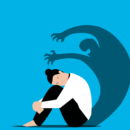OCD guilt, shame, disgust, anxiety & depression: Why treatment sometimes fails (and what to do about it)
OCD isn’t just about anxiety. Although anxiety is certainly a prominent feature of the disorder, clinicians who only attend to anxious symptoms can easily overlook some of its other core features. As a psychologist in Palm Beach, Florida, I work closely with kids, teens, and adults throughout the greater Palm Beach, Fort Lauderdale, and Miami areas on strategies for recovering from OCD. In the patients I treat, anxiety is often accompanied by significant guilt, shame, disgust, and depression. These features are not necessarily related to, or caused by, anxiety; they can be distinct processes. If you (or your psychologist) conceptualize exposure and response prevention (ERP) as only a means to habituate to anxiety but fail to consider how treatment must also address these other features, you are likely to have a suboptimal treatment response and will continue to experience significant...
Read MoreOCD, ERP, & doubt sensitivity: Shattering the illusion of certainty
Many individuals with OCD hunger for certainty. It’s a craving that often can’t be easily sated. Early conceptions of OCD from the 19th century acknowledged this issue directly, in that OCD was often termed the “doubting disease.” It is this need for certainty, the need to eliminate doubt, that leads many people with OCD to perform repetitive behaviors, which are known as rituals. For example, it is doubt about whether one’s hands are sufficiently clean that leads one to engage in repetitive hand-washing rituals. Likewise, uncertainty about whether a stove has been turned off (and worry about potentially dire consequences) can underlie checking rituals. Many different types of rituals involve reassurance-seeking behaviors. For people with OCD who have intrusive bad thoughts (e.g., What if I secretly want to hurt a family member? What if I don’t believe in God...
Read MoreOCD symptoms: the obvious (and the not so obvious)
Symptoms of OCD are everywhere. Turn on your television, and you’re likely to catch at least a fleeting glimpse of obsessive-compulsive disorder (OCD). Many popular TV shows feature characters with OCD (e.g., Emma on Glee, Monk), and it is through this lens that many members of the general population get their first exposure to OCD. Unfortunately, if your understanding of OCD is based solely on depictions in the popular media, you are likely to have a relatively limited (and perhaps, warped) sense of what OCD really is. The truth is that OCD symptoms can manifest in many different ways. Although some symptoms are more common (e.g., a fear about about germs or getting sick), other symptoms can be quite idiosyncratic and often go undetected by inexperienced psychologists. The unfortunate consequence of this is that many people with OCD don’t...
Read MoreThe beginning of something new
Welcome to my blog. My name is Steven J. Seay, Ph.d., and I am a licensed psychologist in Florida and Missouri. I am currently the Director of the Center for Psychological & Behavioral Science. Over the coming weeks and months, I plan to use this blog to offer a variety of useful resources for individuals experiencing symptoms of anxiety and depression. Because obsessive-compulsive disorder (OCD) has always been an area of primary interest for me, I will begin by adding blog posts focusing primarily on OCD and other related conditions. These conditions include compulsive hoarding and trichotillomania (compulsive hair pulling), as well as a variety of other conditions. I will discuss evidence-based treatments for these conditions, symptoms associated with these disorders, strategies for selecting a therapist, and a variety of other topics. If you are interested in learning more...
Read More






